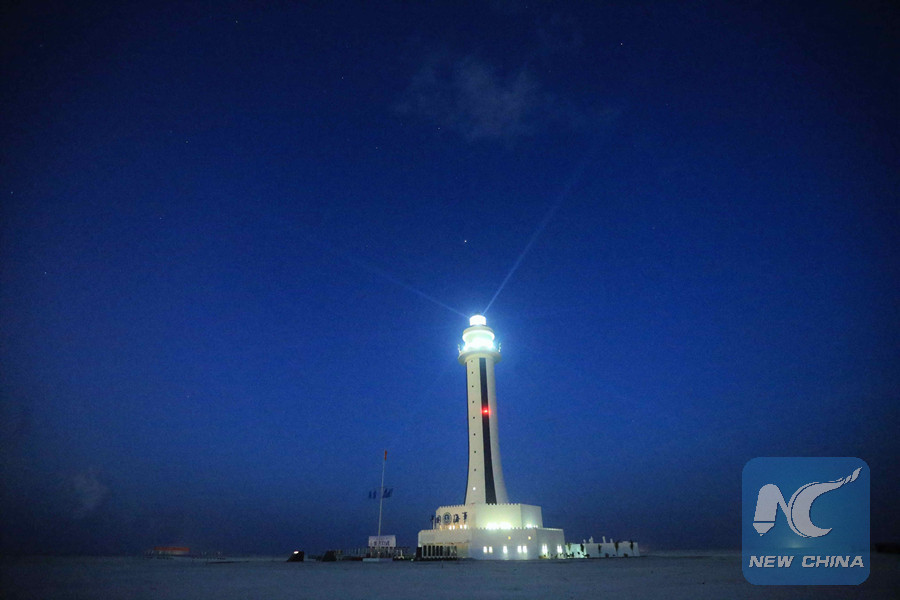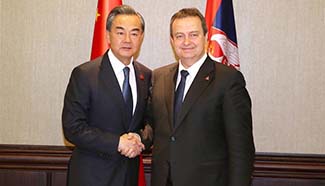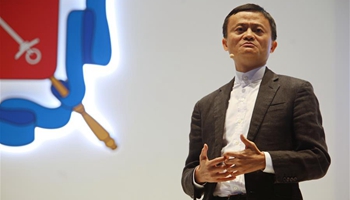
Photo taken on April 5, 2016 shows the lighthouse on Zhubi Reef of Nansha Islands in the South China Sea, south China. (Xinhua/Xing Guangli)
by Marzia De Giuli
ROME, June 17 (Xinhua) -- The most effective way to solve the South China Sea dispute is to hold diplomatic talks between stakeholders and not overdramatize the issue, according to Italian experts.
"Negotiations" are the most effective way to solve the disputes, Giovanni Andornino, professor of international relations of East Asia at the University of Turin and vice president at the Turin World Affairs Institute, said in a recent interview with Xinhua.
In the mid-1990s, China and the Philippines reached a clear agreement on settling their disputes in the South China Sea through negotiation. This has been reaffirmed in many other bilateral documents since then, including the joint statement the two countries issued in September 2011.
However, in 2013, the Philippines unilaterally filed an arbitration case against China at the Permanent Court of Arbitration in The Hague, the Netherlands.
China maintains that the tribunal handling the arbitration proceedings has no jurisdiction over the case, which is in essence about territorial sovereignty and maritime delimitation.
Territorial issues are beyond the scope of the UN Convention on the Law of the Sea (UNCLOS), and China has excluded maritime delimitation from compulsory arbitration in a declaration it made in 2006 in accordance with Article 298 of UNCLOS. Therefore, China has made it clear it will not accept or get involved in those proceedings.
"Safeguarding sovereignty and territorial integrity is one of the priorities of China, which has not acted aggressively but has reacted to its perception of the growing interference by the United States and other countries in the South China Sea," Andornino said.
In his view, working toward formulating a Code of Conduct in the South China Sea issue, accepted by all the interested parties, would be "an extraordinary step forward" to solve the disputes.
For Paolo Borzatta, director and senior partner of think tank The European House-Ambrosetti, the only solution at this moment is "the status quo."
"China has officially said it does not recognize the international arbitration, and after all the international arbitration has not the power to force China to participate," he said.
"The situation is complex and difficult, and I only hope that it does not deteriorate," Borzatta said. "What is certain, however, is that China is not invading any other country, which does not justify an overreaction by the United States."
In his view, the South China Sea issue is indicative of a new balance of power at the international level. "China will play a fundamental role," Borzatta said.
Romeo Orlandi, vice president of the Bologna-based think tank Osservatorio Asia and strategic consultant, agreed with Borzatta that the dispute is a natural evolution of China's peaceful rise, which at the present cannot avoid a digression into political tensions.
For decades during its fast development, China had put aside political issues, especially in its relations with the Unites States, he said. "But now China has almost totally emerged from underdevelopment to become a strong, powerful and respected country," Orlandi told Xinhua.
Related:
China-ASEAN relationship not to be affected by South China Sea arbitration: Indonesian experts
JAKARTA, June 15 (Xinhua) -- As an international tribunal in the Netherlands is expected to rule in a case brought by the Philippines against China on the South China Sea dispute, experts in Indonesia have called on retaining good relationship between ASEAN and China.
"(The dispute) should not become a problem of ASEAN as an organization," Connie Rahakundini, the president of Indonesian Institute for Maritime Studies (IIMS), told Xinhua recently. Full story
Interview: Spanish expert says arbitration not the solution to South China Sea dispute
MADRID, June 13 (Xinhua) -- The director of the Observatory of Chinese Politics of Spain, Xulio Rios, said the key to the solution to the dispute over the South China Sea is consensus, "not unilateral arbitration. The first one brings positions closer, while the second aggravates disputes."
The dispute over the South China Sea are about to enter in a new phase. It is expected that this June, the Permanent Court of Arbitration will announce the decision on the arbitration case brought by the Philippines. Full story











